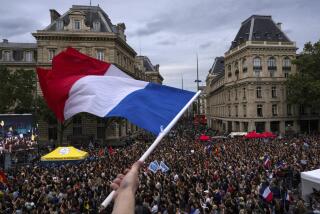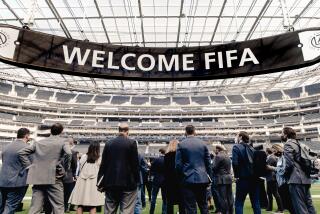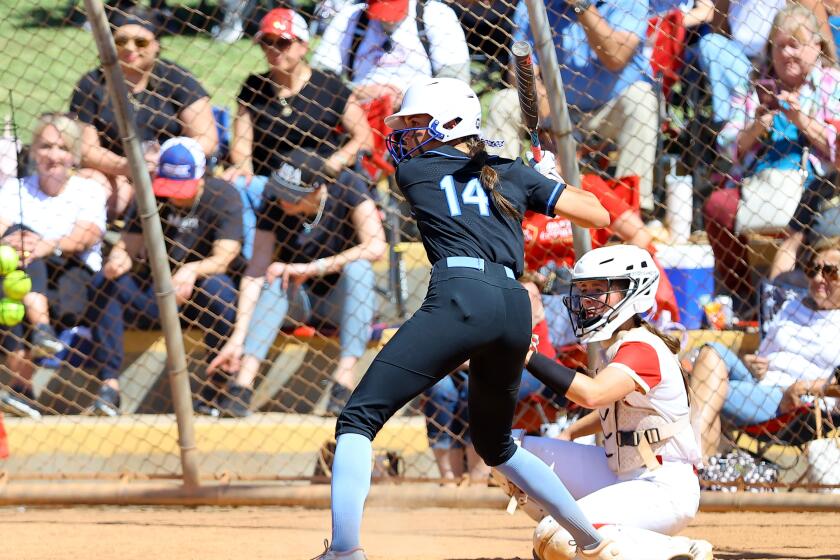TENNIS / JULIE CART : Russians May Yet Say <i> Nyet</i> to Davis Cup
- Share via
PARIS — The venerable institution of Davis Cup isn’t what it used to be. More and more often, fewer and fewer players are willing to alter their schedules to allow for travel and practice time necessary to represent their country.
Germans have required contracts be paid, Americans balk and whine, and now top Russian players are threatening to boycott the next match against Germany.
The controversy has been escalating. The Russian tennis federation chose to hold the semifinal match in Sochi, a seaside city that hopes to be host to the 2002 Olympics. It was also chosen because it is the hometown of Yevgeny Kafelnikov, a hot young player the federation wants on the team.
The International Tennis Federation took one look at Sochi--where the stadium has yet to be built and the airport is substandard--and rejected the bid. The ITF told the Russians the match must be held in Moscow, site of last year’s Davis Cup final.
The players are angry and have loudly complained at the French Open, but their issue is not really about Moscow versus Sochi, it’s a longstanding problem with the federation. As always, Davis Cup players understand that their leverage comes from playing or refusing to play.
The Russian federation has not paid its players from last year’s matches. The ITF pays each participating federation prize money and a share of television revenues. Each federation is responsible for paying players from those funds.
Kafelnikov on Friday accused the ITF of not paying the Russian federation last year. An ITF spokesman confirmed that the ITF had paid the Russians and that if the players weren’t paid, it was because the federation, not the ITF, had failed to meet its obligations.
In any event, a boycott of the September event is looming. Kafelnikov, Andre Medvedev and Andrei Chesnokov say they won’t play.
“If there is Davis Cup in Moscow, we’re definitely not going to play,” Kafelnikov said.
*
Things are done differently at the French Open. Some traditions are wonderful, and some are simply old rules that need revamping.
Two problems this year have been the weather and scheduling, which have led to confusion among players and officials.
The women say the scheduling of their matches is not acceptable--even the usually reticent Steffi Graf spoke out about the day when all women’s quarterfinals were scheduled on remote Court A, while all the men’s quarterfinals on the same day were scheduled on center court.
“I just don’t think it’s right to put none of the women’s matches on center court,” Graf said. “I think there’s something absolutely wrong with that picture. I found out, and I did talk to some of our players. We went to the referees and we discussed it. We made our point. Hopefully, something is going to be changed next year.
“What they said was that last year they had the problem that they put two [quarterfinal] matches outside and two on the center court, and the guys who didn’t play on the center court were not happy. They said they didn’t have a chance to play on center court. So with the women, they said they wanted to give everybody the chance to play on the same court.”
The matter of where to play aside, the issue of when to play is still to be settled. With an abnormal amount of rain disrupting the schedule, French Open officials have not justified their scheduling decisions well.
Boris Becker complained that his match against Adrian Voinea, which was halted in mid-match because of darkness, should never have started in the first place.
That night, the tournament supervisor told Becker and Voinea that all matches were being suspended, but that turned out to be false. Both players accused the official of lying.
Tournament referee Gilbert Ysern, trying to explain the situation, muddied the waters.
“We have a golden rule,” he said. “It is never to lie, whatever the reason, to the players.”
Regarding the notion of starting a match in the rain that officials know will be suspended, Ysern said: “On clay, we can play if there is a drizzle. If the court is not dangerous.”
Yes, but Ysern then revealed the true reason matches are started but not completed.
“We cannot put the comfort of the players before the satisfaction of the public,” he said. “The public would not have understood why they were not playing.”
Tennis Notes
The ATP Tour’s Smash Tennis event for the L.A. area will be held July 29-30 at the Santa Monica pier. Children are invited to play tennis on mini-courts and receive instruction from tour players. They will have a chance to play interactive games and ask questions of top 20 players. The all-day event is free. Details: (310) 312-1197.
More to Read
Go beyond the scoreboard
Get the latest on L.A.'s teams in the daily Sports Report newsletter.
You may occasionally receive promotional content from the Los Angeles Times.











